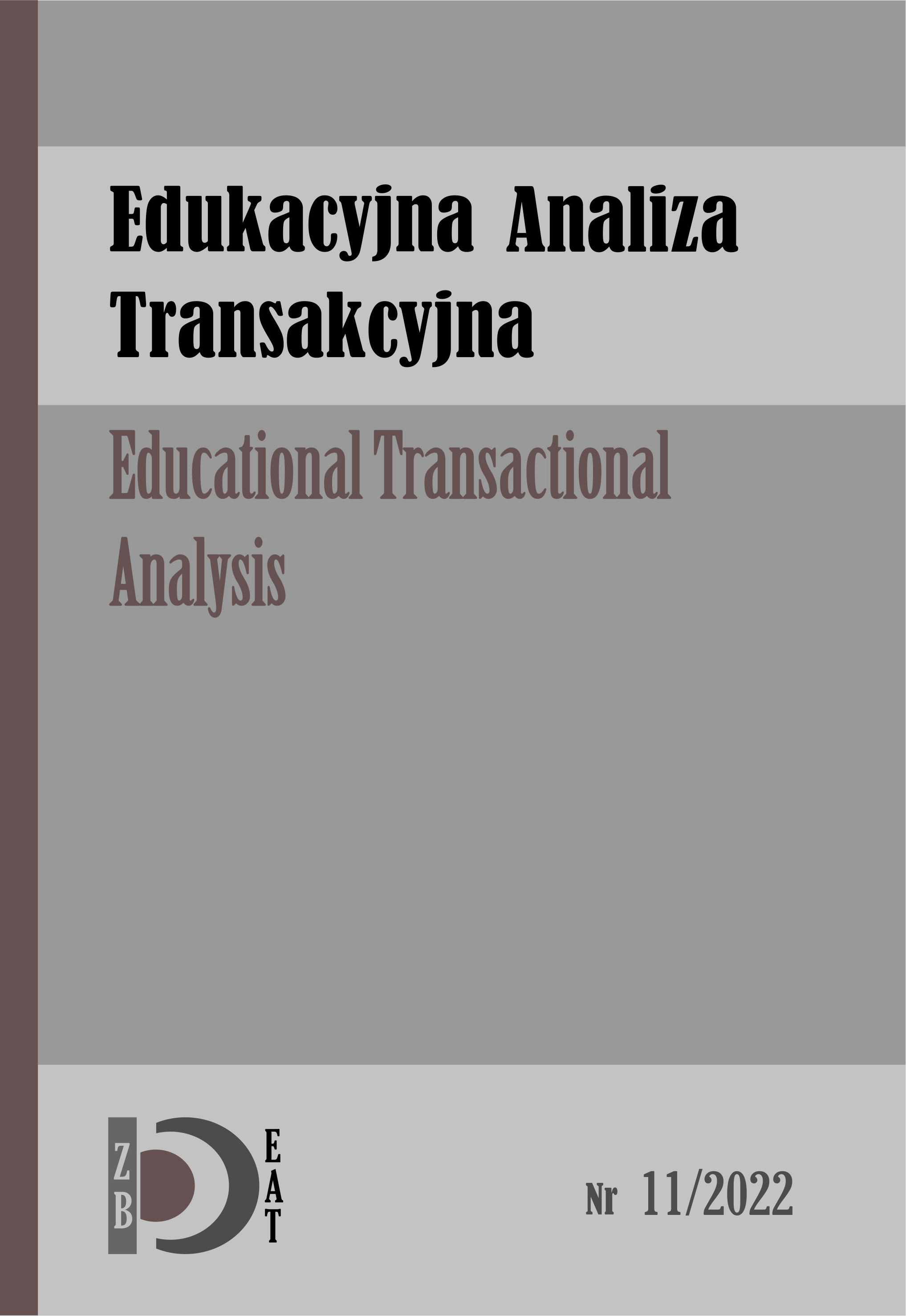Alone with the Pandemic. Maintaining the status quo among the MOPS wards who run private households
DOI:
https://doi.org/10.16926/eat.2022.11.08Keywords:
status quo, lone living, running a private houshold, MOPS beneficiaries, COVID-19 pandemicAbstract
Abstract
Caused by the SARS-CoV-2 virus, the COVID-19 pandemic can already be considered one of the more difficult situations that societies had to face over the last two years. This article presents a quantitative analysis of the assessment and experience of the pandemic period from the perspective of those adult wards of the Municipal Social Welfare Centres (MOPS, the abbreviation derived from the institution’s Polish name) in Katowice and Częstochowa who run independent households. The text closes with a discussion in which the authors attempt to summarise and interpret research results with regard to the assumptions of Transactional Analysis (TA). What inspired the authors to undertake their own research presented here were the research results obtained as part of a project carried out by a team of scholars established to study the determinants of life and work during the COVID-19 pandemic; the research team was formed at the Institute of Pedagogy, Faculty of Social Sciences, University of Silesia in Katowice, and the authors of the present study were its members. In late 2020 and early 2021, the team conducted research on “Challenges, contexts and determinants in the life and work of MOPS wards and staff during the COVID-19 pandemic”. The findings obtained by the team in the course of their research were presented in two reports titled: Social Welfare During the COVID-19 Pandemic. A Report on Research Conducted in the City of Katowice and Social Welfare During the COVID-19 Pandemic. A Report on Research Conducted in the city of Częstochowa. The present study provides an in-depth quantitative insight and further details regarding the aforementioned research results developed within the framework of these reports.
Downloads
References
Berne, E.(1987). W co grają ludzie? Psychologia stosunków międzyludzkich [Games People Play: The Psychology of Human Relationships]. Warsaw: PWN.
Berne, E.(1987). Games People Play. The Psychology of Human Relationships. London-New York: Penguin Books Ltd.
Czurychta M. (2020). „Status quo” w podejmowaniu decyzji finansowych [Status quo bias in financial decision making]. Przegląd Prawno-Ekonomiczny, 3, 67-80. DOI: https://doi.org/10.31743/ppe.9755.
Giles, M. (2007). Transactional Analysis, Pastoral Care and Education, Pastoral Care, March 2007, 21-25.
Goveas, J.S. et al.(2021). Associations between changes in loneliness and social connections, and mental health during the COVID-19 Pandemic: The Women’s Health Initiative, The Journals of Gerontology: Series A , 12 s.1-41. DOI: 10.1093/gerona/glab371
Jagieła, J. (2012). Edukacyjna Analiza Transakcyjna w kilku odsłonach [Educational Transactional Analysis in Several Guises]. Częstochowa: Wydawnictwo AJD.
Madrian, B., Shea, D. (2001). The power of suggestion: Inertia in 401(k) participation and savings behaviour. Quarterly Journal of Economics, 116, 1149-1187. DOI: 10.3386/w7682.
Majewska-Kafarowska, A., Widawska, E., Nieduziak, E., Michalski, Ł., Moczia, K., Niemiec, M., Dobosz, D., Gierczyk, M., Kitlińska-Król M., Szafrańska, A. (2021). Pomoc społeczna w trakcie pandemii COVID-19. Raport z badań przeprowadzonych na terenie miasta Częstochowa [Social Welfare During the COVID-19 Pandemic. A Report on Research Conducted in the City of Częstochowa]. Katowice-Kraków: Wydawnictwo AT.
Majewska-Kafarowska, A., Widawska, E, Nieduziak, E., Michalski, Ł., Moczia, K., Niemiec, M., Dobosz, D., Gierczyk, M., Kitlińska-Król M., Szafrańska, A. (2021). Pomoc społeczna w trakcie pandemii COVID-19. Raport z badań przeprowadzonych na terenie miasta Katowice [Social Welfare During the COVID-19 Pandemic. A Report on Research Conducted in the City of Katowice]. Katowice-Kraków: Wydawnictwo AT.
Michniewicz, T. (2020) Chwilowa anomalia. O chorobach współistniejących naszego świata [A Temporary Anomaly. On the Comorbidities of Our World]. Kraków: Wydawnictwo Otwarte.
Miller, E.D. (2020). Loneliness in the Era of COVID-19. Frontiers in Psychology, 11, 1-3. DOI: https://doi.org/10.3389/fpsyg.2020.02219.
Paplicki, M., Susło, R., Drobnik, J., Sobieszczańska, M. (2019) Osoby starsze jako osoby niepełnosprawne [The elderly as the disabled]. In: . J. Blicharz, T. Kocowski, M .Paplicki (eds.), Spółdzielnie socjalne oraz organizacje pozarządowe wsparciem dla zagrożonych wykluczeniem [Social Cooperatives and NGOs Support for Those at Risk of Exclusion] (pp.145-158). Wrocław: Prace Naukowe Wydziału Prawa, Administracji i Ekonomii Uniwersytetu Wrocławskiego. Series: e-Monografie Nr 151.
Samuelson, W., Zeckhauser, R. (1988). Status quo bias in decision making. Journal of Risk and Uncertainty, 1, 7-59. DOI: http://dx.doi.org/10.1007/BF00055564
Spitzer, M. (2016). Cyberchoroby. Jak cyfrowe życie rujnuje nasze zdrowie [Cybersickness. How digital reality ruins our life]. Gdańsk: Wydawnictwo Dobra Literatura.
Tyszka, T. (2010). Decyzje. Perspektywa psychologiczna i ekonomiczna [Decisions. Psychological and Economic Perspectives]. Warsaw: Wydawnictwo Naukowe SCHOLAR.
Włodarczyk, E. (2021). Samotne macierzyństwo w różnych odsłonach [Various aspects of single motherhood]. „Problemy Opiekuńczo-Wychowawcze”, 1, pp. 3–17. DOI: 10.5604/01.3001.0014.6895.
Żurek, A. (2003). Osoby samotne życiowo jako zjawisko społeczne [Singlehood as a social problem]. Blaski i Cienie Życia Rodzinnego. Roczniki Socjologii Rodziny, XV , pp. 123–136.
https://stat.gov.pl/metainformacje/slownik-pojec/pojecia-stosowane-w-statystyce-publicznej/103,pojecie.html [Accessed 25.05.2022].
Downloads
Published
How to Cite
Issue
Section
License
Copyright (c) 2022 Krystyna Moczia, Marta Niemiec

This work is licensed under a Creative Commons Attribution 4.0 International License.
I am aware that the Educational Transactional Analysis journal is published under a Creative Commons license - Attribution (https://creativecommons.org/licenses/by/4.0/legalcode).
By submitting the article, I agree to make it available under this license

